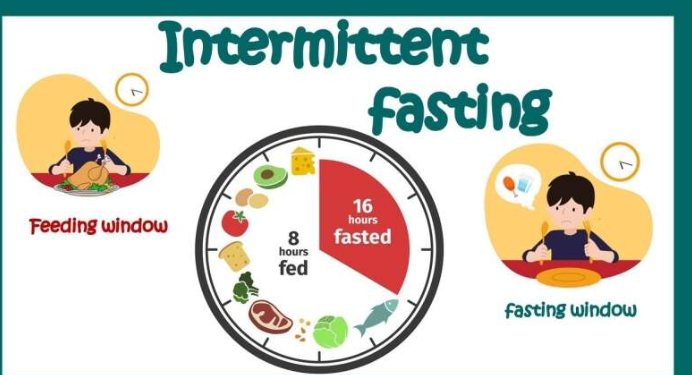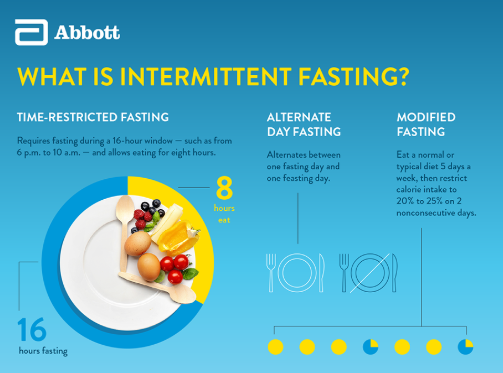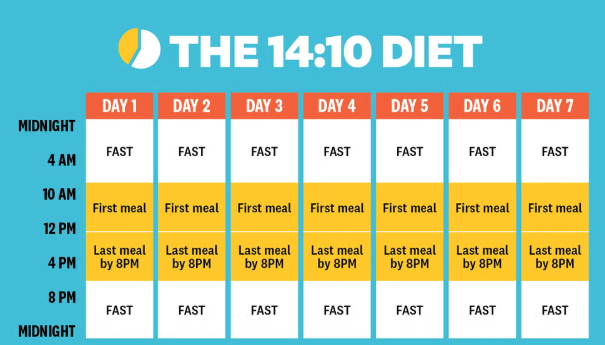Intermittent fasting is one latest lifestyle that features taking food and fasting in men and women. While most diets tell dieters what and how to eat, time is the main feature of this new concept: how well to integrate meals into life events. It aids weight loss, metabolic health, and will or might increase longevity. But how does it really function?
At the cellular and molecular levels, many changes occur in the body, similar to those at the time of fasting. For instance, there is a decreased secretion of insulin during fasting which enhances fat burning. Growth hormones level increase and repair of muscles occurs as well as fat metabolism.The body activates cellular repair processes: for example, autophagy, which is a process in the body that removes damaged cells, makes them die, and regenerates them.
Intermittent fasting allows energy deficit, so the body directly uses stored fat as the energy source. Not merely just eating less; to allow the body time to heal and reset itself.
What is the rule of intermittent fasting?
Intermittent fasting is simply a rule of eating alternated with fasting. However, the methods to be followed are quite many and among the most important ones.
- Follow a schedule: Choose a fasting plan that fits in with your lifestyle. Some typical examples are: 16:8, 5:2, and 24-hour fasts.
- Stay hydrated: However, one may probably consume water, tea, or any beverage that does not carry calories while still fasting.
- Prioritize nutrient-dense meals:Periods of food intake are reserved for whole nutrient-dense foods including fruits, vegetables, lean proteins, and healthy fats.
- Avoid overeating:It could especially signpost a setback when, after fasting, you do make up for the missed meals.
- Be consistent:At least two weeks should pass before knowing whether or not any results are had with intermittent fasting.
- Listen to your body:Readjust your fasting if you feel else: weak, lightheaded, or unwell, or consult a medical expert.
Is it better to fast for 12 or 16 hours?
Fasting these days usually comprises of 12 h and 16-hour fasting durations. Each has its different advantages and disadvantages.

- 12-Hour Fast: This particular schedule is mostly appropriate for beginners. You begin fasting for 12 hours, then eating for a further 12 hours. So for instance, if the last meal of the previous day was at 8 PM, breakfast can be taken the next morning at 8 AM. This schedule is quite simple to accommodate within the normal sleep cycle.Benefits of 12-hour fasts:
- Less difficult for newbies.
- Assists in regulating blood sugar levels.
- May help in refreshing cells.
- 16-Hour Fast (16:8 method): For example, during the fast of 16 an eating window of 8 hours, you would consume food from noon to 8 PM. After 8 PM, you would fast until noon the following day.
- Benefits of 16-hour fasts:
- Much more effective and efficient in losing weight.
- Autophagy is encouraged.
- Increases insulin sensitivity.
The first time it might be worth trying fasting for 12 hours. When you get used to this, increase your fasting time to 16 hours for maximum health benefits.
How do you do intermittent fasting?
To begin doing intermittent fasting might sulk into your mind, but then the steps below make it so much easier:
- Choose your fasting method: Choose one out of these types according to your way of living and health goals:
- Plan your eating and fasting windows: Follow the same daily schedule for staying consistent.
- Start slow:A 12-hour fast could be your starting point and go on to 16:8 if you like it.
- Stay hydrated:Try only drinking water, herbal tea, and black coffee if you want to suppress hunger while fasting.
- Eat nutrient-dense meals:Consume wholesome foods that promote fullness over longer periods: lean proteins, healthy fats, fiber-rich vegetables.
- Track your progress:Keep a daily record by means of an app or diary where you would track your daily food intake and connect that to how you usually feel.
How to lose 2kg in a week with intermittent fasting?
If practiced with enough discipline and consistency in fasting habits, it can result in loss, perhaps around 2 kilograms (or about 4.4 pounds) in a week.
Can I exercise while fasting?
Yes, working out while fasting is possible. Ideal exercises would be walking or yoga, while low to moderate intensity is best for workouts. Schedule your high-intensity work during or after your eating window for maximum energy and recovery.
Will intermittent fasting slow my metabolism?
The fact, of course, is the absolute opposite. Intermittent fasting slows the metabolism down, while short-term fasting speeds up metabolism because of the improvement of fat-burning hormones. Just don’t practice severe calorie deprivation for prolonged periods.
- Follow the 16:8 method:Rely on a daily fast of 16 hours to consume food during 8 hours.
- Caloric deficit:One substantial deficit could be incurred just by eating less in the present reality than by burning calories.
- Eat nutrient-dense meals: Even when an individual eats chips and chocolate, there should be whole foods like vegetables, lean protein, and healthy fats to offset the junk.
- Avoid sugary drinks: Get rid of sugar-containing drinks which unnecessarily add calories.
- Stay active:Include at least 30 minutes of exercise daily.
- Hydration: Drink lots of water to curb hunger and keep energy levels high.
It can bring forth a healthy reduction of 2 kilos within a week if done religiously.Things like age, sex, metabolism have to do with the fact that a few variables have a person’s weight change.
Intermittent Fasting 101 — The Ultimate Beginner’s Guide
If you are an absolute beginner in intermittent fasting, this is the entire guide for you about it:
- What is intermittent fasting:A kind of eating habit where periods involve alternating intervals for eating and fasting them regularly.
- How does it work:When this happens, the body creates a calorie deficit, lowers its insulin levels, and mobilizes fat-burning processes.
- Benefits of intermittent fasting: Proficient forces to decrease weight, improve metabolism, boost brain function, and repair cells
- Types of intermittent fasting:16:8, 12:12, 5:2, Eat-Stop-Eat, and Alternate-Day Fasting,
- Tips for beginners: The commencement of the 12-12 pattern, in addition to bingeing, will keep someone with watered- down consumption.
6 Ways to Do Intermittent Fasting: The Best Methods
There are several types of intermittent fasting. The 6 most popular methods are as follows:
- 16:8 Method: -Fast for 16 hours, eat in 8.
- 5:2 Diet:-Regular eating for 5 days, with 2 days’ restriction of calorie consumption to 500-600.
- 12:12 Method: Fast for 12 hours, eat at 12.
- Alternate-Day Fasting: Fast every other day or on reduced calorie intake.
- Eat-Stop-Eat:24-hour fast once or twice weekly.
- Warrior Diet::Fast for 20 hours, eat one meal in a 4-hour window.
Such methods elegantly address individual preferences and different lifestyles. It is quite common for students to start with the 12:12 or 16:8 fasting regime before going on to more strict kinds, such as alternate-day fasting.
Health Benefits Beyond Weight Loss
Intermittent fasting loses weight as apart from other health benefits of intermittent fasting. The increase in brain-derived neurotrophic factor production by intermittent fasting, in fact, has been associated with brain stimulation activity. Among other things, this protein has been found to be linked to cognitive health.
For starters, higher levels of BDNF in the brain bring about improved memory and learning, as well as less risk for neurodegenerative diseases, such as Alzheimer’s disease. Intermittent fasting also demonstrates the reduction of inflammation due to many pathological reasons in chronic diseases such as heart disease, diabetes, or certain cancers. Therefore, fasting may well align with decreasing age and better quality of life by enhanced autophagy or induction of fasting, promoting repair of cells.
Common Challenges and How to Overcome Them
Intermittent fasting could be helpful, but it is something that may face people with challenges, particularly during its initiation stage in the case of the beginners. Fasting periods are usually accompanied by hunger pangs. Drink water or herbal teas, or even just black coffee; all these help one to counteract the pangs of hunger. Initially, one must be careful to keep his energy levels rather up to par.

And that can be assured by increasing up fasts gradually, instead of starting with a long, lengthy fast. There always comes the time when an event or family gathering disrupts a fasting schedule. However, one’s fasting habits can complement these events by planning ahead, or opting just for a less structured fasting method, such as the 12:12 schedule.
Who Should Avoid Intermittent Fasting?
Intermittent fasting is safe for most individuals, however, this does not mean that it suits all people. Pregnant and nursing women, as well as persons with a record of eating disorders, should not join this fasting schedule, along with patients with certain conditions like diabetes or low blood pressure. It is best to consult with your healthcare professional first before practicing this fasting regimen.Children and teenagers, who are still growing, are also advised not to enter a fasting protocol that restricts the amount of nutrition they consume.
Those with medications that require food intake may face a challenge; hence, it is better to consult their health care provider for safe implementation of this fasting into their unique health needs.
Conclusion
Cellular repair, weight loss, and metabolic health all benefit from intermittent fasting. Structured periods of eating and fasting thus allow a person to use the body’s natural processes to burn fat and improve well-being. Of all the methods in this way, the 12:12 and 16:8 are the most achievable for beginners, while seasoned fasters might be exposed to tough protocols like Eat-Stop-Eat or the Warrior Diet.

By understanding the rules of intermittent fasting, selecting the right schedule, and following essential guidelines, it can easily be made part of any individual’s lifestyle. Even better, for people that want to lose weight fast like 2 Kg in a week, intermittent fasting is healthy and sustainable.












Leave a Reply